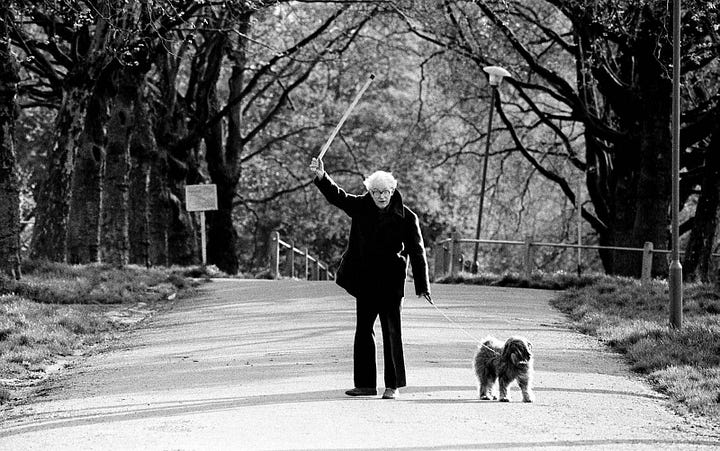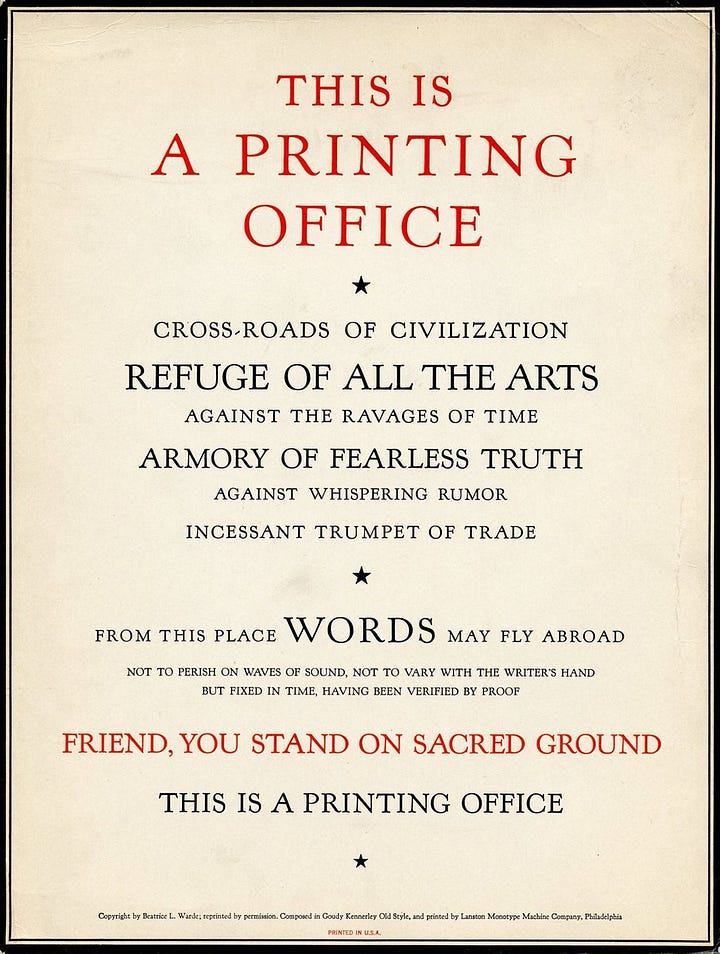At the start of my career I was fortunate to work on a book with Michael Foot.
Here he is, with his dog Dizzy:

In the early 1980s, Michael was the leader of the UK’s Labour Party.
It didn’t go too well for him. He led the party to a crushing defeat at the hands of Margaret Thatcher in the 1983 election. The party’s left wing policy manifesto was described as “the longest suicide note in history”.
But it would be a shame if that election was seen as Michael’s only legacy, because he was an intellectual giant.
To visit his house in Hampstead was to enter a paradise of books and learning. Books were piled high, up to the ceilings, up the staircases. He read with voracious curiosity. His interests spanned history, philosophy, the arts, literature. His heroes were William Hazlitt, Tom Paine, Jonathan Swift, Emmeline Pankhurst, H.G. Wells. He wrote like an angel. He loved learning and sharing what he had learned.
And he was interested in design as well.
My job was to typeset his book and design the cover. I was new to design — young, naive and self taught as a designer.
Michael took an interest.
He told me about his friend, the great typographer Stanley Morison. Of how, in the 1940s, Morison had taught him about newspaper design and how to typeset and lay out pages for the left wing magazine Tribune. He talked of how the two of them would go to the home of the press baron Lord Beaverbrook and irritate him by loudly playing The Red Flag, anthem of the left, on his piano. He talked about how advances in offset printing in the early 20th century had enabled cheaper mass communication via books and newspapers.
He showed me how a commitment to social progress, to design, to craft and to the embrace of new technology for communication are linked. And how together, they have a moral force.
This is an idea I have carried with me ever since. It’s why I founded Soapbox.
Morison worked at the Monotype Corporation where his colleague was the American typographer Beatrice Warde. Today she is perhaps best known for her broadside “This is a Printing Office”. Here it is:

They were from the same generation as Allen Lane, founder of Penguin Books, who used new printing technology to bring ideas, commentary and classics of literature to the mass market.
The same generation of people who went on to found institutions like the Open University, the National Theater, the Institute for Fiscal Studies, the National Center for Social Research.
We can see the same spirit in American organizations like the Aspen Institute, the Urban Institute or the Pew Charitable Trusts. Or in European foundations like the Robert Bosch Stiftung or the Bernard van Leer Foundation. And, of course, in the United Nations. Post-war organizations founded in optimism about the power of knowledge, culture and cooperation to build a new world.
Morison, Warde and Foot believed that clear, high quality design, allied to new technology — in this case mass market printing — could bring knowledge to everyone. And that in doing so, they would bring about social progress.
That sentiment would later be echoed by Tim Berners-Lee and other pioneers of the early internet. They believed that an open web, backed by high and unified standards was a public good and a basic right. The right to knowledge. The right to be heard.
And when we look at the challenges we face today — climate change, inequality, war — then it’s clear that that spirit is needed more than ever. We cannot meet those challenges by concentrating power in the hands of the privileged or placing it at the service of strongmen like Putin and Trump.
Knowledge is power. The knowledge generated by the kind of clients we work with at Soapbox has the potential to empower everyone. To help bring about the progress we need. But only if it can be put in the right hands. Only if it is presented in clear, compelling and purposeful ways. Only if it is findable, sharable, and accessible — multiplying across channels, finding the places where it can be put to use in the name of progress.
In our own small way, in our own little niche, I like to think that we at Soapbox are part of the same intellectual tradition as Michel Foot, Stanley Morison and Beatrice Warde. Like them, we believe that ideas, evidence, knowledge, and the discourse that surrounds them, has moral force. That allied to design, to craft, to open standards, to purposeful communications, ideas can build a better world.